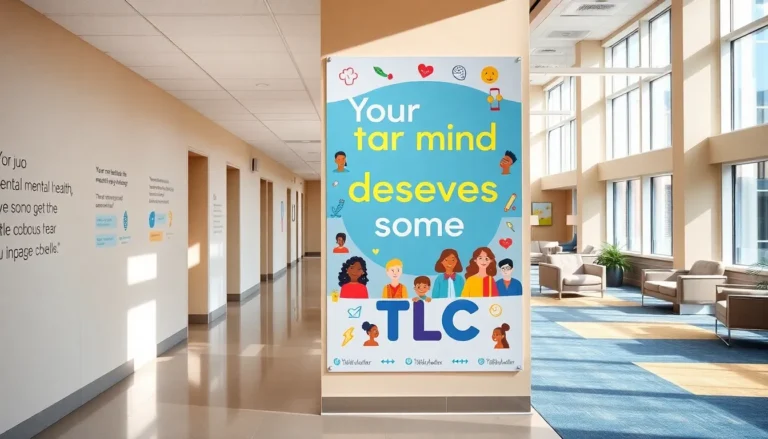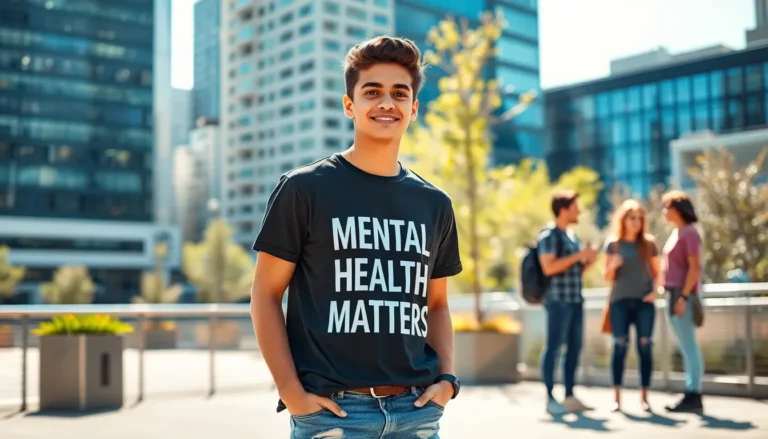Table of Contents
ToggleIn today’s fast-paced world, mental health is more important than ever. With rising stress levels and increased awareness of mental well-being, many people are turning to technology for support. Mental health apps have emerged as a popular solution, offering users convenient access to tools and resources that can help improve their emotional well-being.
These apps cater to a wide range of needs, from mindfulness and meditation to therapy and mood tracking. They empower individuals to take charge of their mental health in a way that fits their lifestyle. As the stigma around mental health continues to diminish, the role of these digital resources in promoting self-care and emotional resilience is becoming increasingly significant.
Overview of Mental Health Apps
Mental health apps serve as valuable tools for individuals seeking to enhance their emotional well-being. These digital resources provide accessible support for a variety of mental health concerns.
Definition and Purpose
Mental health apps are software applications designed to improve emotional well-being. They offer features such as guided meditation, mood tracking, therapy sessions, and educational resources. These apps aim to empower users to manage stress, anxiety, depression, and other mental health challenges independently. By providing instantaneous access to resources, mental health apps foster a proactive approach to personal care and self-management.
Types of Mental Health Apps
Various types of mental health apps cater to different user needs:
- Meditation and Mindfulness Apps
Apps like Headspace and Calm offer guided sessions for mindfulness and meditation. Users engage in techniques that enhance relaxation and reduce anxiety.
- Therapy Apps
Platforms like BetterHelp and Talkspace connect users with licensed therapists via text, audio, or video. Users access professional support whenever convenient, improving access to mental health care.
- Mood Tracking Apps
Apps such as Moodfit and Daylio allow users to log emotions, track triggers, and identify patterns. These provide insights into mental health trends, enabling targeted interventions.
- Cognitive Behavioral Therapy (CBT) Apps
Tools like Woebot and MoodTools utilize principles of CBT to help users manage negative thought patterns. Interactive features guide individuals through coping strategies.
- Self-Help and Educational Apps
Resources like Happify and My Strength offer exercises and educational materials that promote mental resilience. Users learn techniques and strategies to foster emotional wellness.
These classifications reflect the diverse landscape of mental health apps available today, allowing users to choose solutions aligned with their specific requirements.
Benefits of Mental Health Apps

Mental health apps offer numerous benefits, making mental wellness more attainable. Users gain access to essential tools that enhance emotional health and promote self-care.
Accessibility and Convenience
Accessibility and convenience characterize mental health apps. Users can access these resources anytime and anywhere, providing flexibility for their schedules. Apps eliminate barriers associated with traditional therapy, such as location constraints and lengthy waiting times. Quick registration processes allow users to start immediately, while many apps offer free or low-cost options. The availability of these tools 24/7 enables individuals to seek help as needed, fostering a proactive approach to mental well-being.
Personalization and Customization
Personalization and customization enhance the effectiveness of mental health apps. Many apps enable users to tailor their experience based on individual preferences and needs. Users can select specific goals, such as stress reduction or mood improvement, and receive personalized content and exercises. Assessments help identify mental health challenges, leading to customized recommendations. This targeted approach allows users to engage with the app in ways that resonate most, improving adherence and outcomes in managing mental health effectively.
Popular Mental Health Apps
Numerous mental health apps support emotional well-being, making them essential tools for many individuals. These apps vary in purpose and functionality, catering to a wide range of needs in the mental health landscape.
Overview of Leading Apps
Several notable apps stand out in the mental health space.
| App Name | Type |
|---|---|
| Headspace | Meditation and Mindfulness |
| Calm | Meditation and Mindfulness |
| BetterHelp | Therapy |
| Talkspace | Therapy |
| Moodfit | Mood Tracking |
| Daylio | Mood Tracking |
| Woebot | Cognitive Behavioral Therapy |
| MoodTools | Cognitive Behavioral Therapy |
| Happify | Self-help and Educational |
| My Strength | Self-help and Educational |
Each app serves a specific audience and purpose, facilitating personalized approaches to mental health management.
Features and Functionality
Mental health apps offer a variety of features to enhance user experience.
- Guided Meditation: Users access meditative practices, promoting relaxation and mindfulness.
- Mood Tracking: Users log emotions, allowing for patterns and triggers to be identified.
- Therapy Sessions: Users engage in professional counseling via video or chat, expanding access to mental health care.
- Educational Resources: Users learn coping strategies and mental health information, fostering informed self-care.
- Customization: Users tailor settings and content, ensuring relevance to individual preferences and experiences.
These features contribute to effective mental health management, empowering users to take control of their emotional well-being.
Challenges and Limitations
Mental health apps present various challenges and limitations that users must consider. Awareness of these issues promotes a more informed use of these resources for mental well-being.
Privacy and Data Security Concerns
Privacy and data security issues arise with the use of mental health apps. Many apps collect sensitive personal information, including health history and behavioral patterns. If users don’t choose reputable apps, the risk of data breaches or misuse of their information increases. Some apps may lack adequate encryption or adhere to minimal security standards. Users must read privacy policies carefully to understand data collection practices and decide how to protect their personal information.
Efficacy and Scientific Backing
Efficacy concerns exist regarding the scientific backing of many mental health apps. While numerous apps claim to provide therapeutic benefits, not all have undergone rigorous research or clinical trials to validate their effectiveness. The lack of standardized metrics makes it difficult to compare apps objectively. Users often face challenges in finding evidence-based resources that deliver reliable results. Seeking guidance from mental health professionals can help users select suitable apps that align with their therapeutic needs.
Future Trends in Mental Health Apps
Mental health apps are evolving rapidly to meet the needs of users across different demographics. Innovations and integrations are shaping the future landscape of these digital resources.
Innovations on the Horizon
Critically, artificial intelligence (AI) and machine learning (ML) are emerging trends within mental health apps. AI-driven features can personalize user experiences, offering real-time feedback based on individual mood and behavior patterns. Enhanced analytics will allow apps to provide adaptive learning, improving engagement and efficacy. Additionally, virtual reality (VR) and augmented reality (AR) technologies are gaining traction, creating immersive environments for mindfulness and therapeutic interventions. These innovations stand to augment traditional mental health management techniques, addressing various user preferences.
Integration with Telehealth Services
Increasingly, mental health apps are integrating with telehealth services, expanding access to professional care. This integration enables users to transition smoothly between self-guided resources and live consultations with licensed therapists. It allows for a cohesive approach to mental health, where tracking progress through the app informs therapy sessions. Additionally, hybrid models combining app usage with teletherapy appointments are becoming commonplace, ensuring comprehensive support for mental health challenges. Such advancements reinforce the commitment to accessibility and personalized care within the mental health landscape.
Mental health apps are transforming the way individuals approach their emotional well-being. With a diverse range of tools and resources at their fingertips, users can engage in self-care practices tailored to their unique needs. As technology continues to evolve, these apps are likely to become even more sophisticated, integrating advanced features that enhance user experience.
While the benefits are significant, it’s essential for users to remain vigilant about privacy and data security. Choosing reputable apps and consulting with mental health professionals can ensure a safe and effective journey toward improved mental health. The future of mental health apps looks promising, offering a blend of accessibility and personalized care that empowers individuals to take charge of their emotional wellness.




